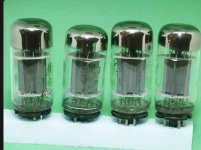Hi!
Are there any recommendations on handling tubes with coin bases like the 6P3S-E? How strong is the base attached to the bulb? Best practices to remove the tube from the socket?
Thanks!
Are there any recommendations on handling tubes with coin bases like the 6P3S-E? How strong is the base attached to the bulb? Best practices to remove the tube from the socket?
Thanks!
'Best practices to remove the tube from the socket?'
Let it cool before you remove it. Otherwise you can burn yourself.
Let it cool before you remove it. Otherwise you can burn yourself.
I learned that one more than 40 years ago 😀'Best practices to remove the tube from the socket?'
Let it cool before you remove it. Otherwise you can burn yourself.
Don’t worry about it, they are made to be used roughly. I’ve never had one separate from the tube glass.Hi!
Are there any recommendations on handling tubes with coin bases like the 6P3S-E? How strong is the base attached to the bulb? Best practices to remove the tube from the socket?
Thanks!
That's great to know, thanks! I never used those before, the base looks so thin and fragile, I was a bit worried. Having said that, the 6P3S-E is the military version, should be able to handle a bit of rough treatment.Don’t worry about it, they are made to be used roughly. I’ve never had one separate from the tube glass.
The base is almost impossible to hold. Is wafer thin, add to that my sausage fingers, hence my question.hold it by the base...after it cooled down,
Attachments
If you can get to the underside, push it out a little way by pushing on the spigot (a plastic stick or the like) then pull straight up and out from above. (The correct way to remove octals.)
Otherwise just pull up as straight as you can from as near the base as possible. I've never had one break or felt it would.
Otherwise just pull up as straight as you can from as near the base as possible. I've never had one break or felt it would.
Yes, something like that. I was thinking about making a small tool, similar to the ones used to remove DIP ICs from the base.If you can get to the underside, push it out a little way by pushing on the spigot (a plastic stick or the like) then pull straight up and out from above. (The correct way to remove octals.)
Otherwise just pull up as straight as you can from as near the base as possible. I've never had one break or felt it would.
With the price of 6P3S-E tubes going up I understand your concern. However, I have been using 6P3S-Es for over 15 years in a “normal way” and never had an issue with the wafer base breaking. My sockets are not super tight, though. If yours are perhaps loosening the sockets gently is in order.
I'm using Belton sockets, I jyst tried an old 6P3S, normal base, and is damn tight. I'm going to try loosening the socket a bit.
So how do you pull out novars or compactrons? Or miniatures, for that matter? You just have to grab it by the glass, closer to the base the better. They are not like projector lamps where just a bit of oil on the glass causes it to shatter next time it heats up. Never had a tube do *that*.
Is not about the glass breaking, but about the risk of detaching the base from the glass. The contact surface between the glass and the base is much smaller, and these valves are usually NOS from the 70's and 80's.So how do you pull out novars or compactrons? Or miniatures, for that matter? You just have to grab it by the glass, closer to the base the better. They are not like projector lamps where just a bit of oil on the glass causes it to shatter next time it heats up. Never had a tube do *that*.
I think it would take considerable force to separate the coin base and you are not applying any such force by pulling vertically on the glass.
i use metal jacketed octals, or busted tubes to break-in a new socket, i also use them when soldering at the pins, although not really necessary it gives me peace of mind that the pins are aligned fit...
some octals sockets are tight when still virgins and you have to devirginize them.....
you also do not want them to come very loose either....it takes practice...and patience...
some octals sockets are tight when still virgins and you have to devirginize them.....
you also do not want them to come very loose either....it takes practice...and patience...
Pull it gently straight out, do not wiggle. I've used these tubes in the past with no special precautions beyond this.
Don't mess with the sockets, they'll loosen up of their own accord, and you don't want intermittent connections later.
Don't mess with the sockets, they'll loosen up of their own accord, and you don't want intermittent connections later.
- Home
- Amplifiers
- Tubes / Valves
- Handling coin base valves
